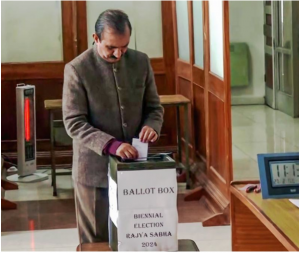ForumIAS announcing GS Foundation Program for UPSC CSE 2025-26 from 19 April. Click Here for more information.
ForumIAS Answer Writing Focus Group (AWFG) for Mains 2024 commencing from 24th June 2024. The Entrance Test for the program will be held on 28th April 2024 at 9 AM. To know more about the program visit: https://forumias.com/blog/awfg2024
Source-This post on Cross-voting in Rajya Sabha elections is based on the article “On cross-voting in Rajya Sabha elections | Explained” published in “The Hindu” on 29th February 2024.
Why in the News?
The recent Rajya Sabha elections in Uttar Pradesh, Himachal Pradesh, and Karnataka saw MLAs from various parties engaging in cross-voting. This has sparked concerns regarding the integrity of the election process.
How are Rajya Sabha elections held?

1. Constitutional Provision: According to Article 80 of the Constitution, Rajya Sabha representatives from each State are indirectly elected by the elected members of their Legislative Assembly.
2. Historical background– Before 1998, the outcome of Rajya Sabha elections were usually a foregone conclusion, as the candidates were nominated by various parties in accordance to their strength in the Assembly. Hence, they used to be elected unopposed. However, the June 1998 elections in Maharashtra saw cross-voting, breaking this tradition.
Legal provisions and precedent for curbing cross voting
1. Open Ballot system:
a. To prevent MLAs from cross-voting, an amendment to Section 59 of Representation of the People Act, 1951 was made in 2003. This amendment introduced open ballot voting in Rajya Sabha elections.
b. MLAs from political parties must display their ballot papers to their party’s authorized agent. Failure to do so or showing it to anyone else will invalidate the vote. Independent MLAs cannot show their ballots to anyone.
2. Tenth Schedule:
a. It introduced in 1985.
b. This schedule states that if a member of a Parliament or State legislature voluntarily leaves their political party or votes against their party’s instructions, they can be disqualified from the House. However it does not apply to Rajya Sabha elections
| Read more– Tenth Schedule |
3. SC Court Rulings:
a. The Supreme Court in Kuldip Nayar versus Union of India (2006), upheld the system of open ballot for Rajya Sabha elections.
b. In the same case, the court also decided that a political party’s elected MLA would not be disqualified under the Tenth Schedule for voting against their party candidate. They might face disciplinary action from their party at most.
UPSC Syllabus- Polity and Nation (Bills and Acts)




